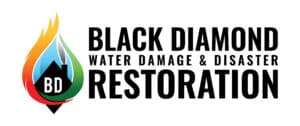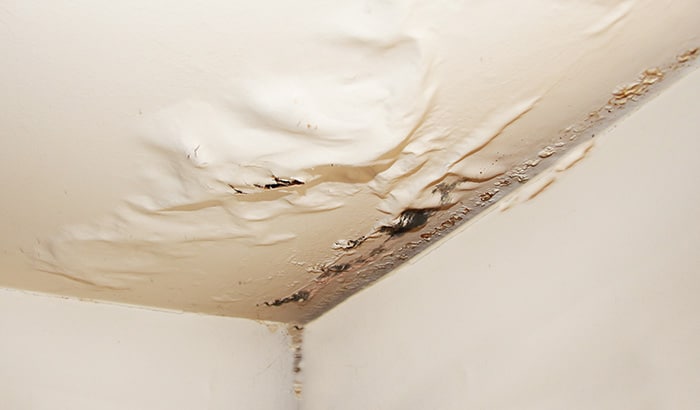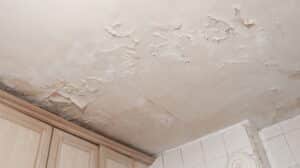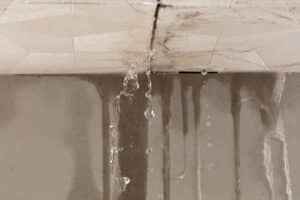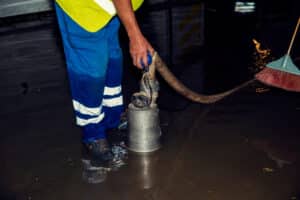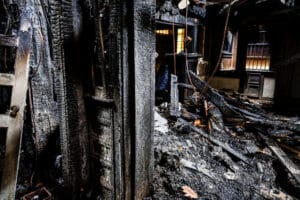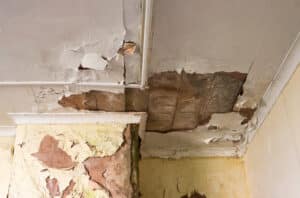Water damage is a dreaded concept for homeowners and landlords alike. It’s hazardous since the evidence is often hiding in the ceilings, walls, or floors of your home, only becoming visible when it’s become an enormous problem. It’s an issue that needs to be dealt with right away – as soon as there are signs of damage.
What are the signs of water damage? And what happens if water damage goes untreated? That’s what we’re discussing in today’s blog. Keep reading to learn more!
Signs of Water Damage
Knowing what damage looks like is the first step to treating it. If you don’t know what it looks like, how are you supposed to recognize and treat it? Signs of water damage include:
- Wet spots you can see.
- Abnormal color streaks on your wall.
- Cracked walls.
- Bubbling paint.
- Soft walls.
- Running water inside your walls.
- Musty or damp smell.
- Leaks.
- Visible mold.
- Higher water bills.
We’ve also discussed where to look for water damage, so you can proactively protect your home.
But there are situations where the water damage isn’t your fault. Say you move into an apartment and, two weeks later, you realize there’s untreated damage that needs immediate treatment. In that case, your best bet is to contact your apartment complex management and express how urgent you believe the problem is.
But what if they need convincing to come to check out the problem?
This section covers what happens when water damage goes untreated and why everyone should take it seriously.
Effects of Untreated Water Damage
Simply put, untreated water damage is expensive. It results in all kinds of damage requiring money to fix. It’s money coming out of your wallet from corroded pipes to damaged ceilings to a ruined electrical system. Not only that but even after fixing it, having had water damage will lower your home’s value. Let’s take a deeper look.
Your Home’s Value
Water damage is evident once it gets bad enough. Even if the problem has been resolved, you can still see the evidence on your walls. You can try painting over it, but water damage isn’t easy to hide behind a new coat of color.
An inspector will be able to spot water damage from a mile away and will make a note of it in their report, resulting in lower offers on your home or even no offers at all when it comes time to sell it.
Immediately treating water damage will prevent your home’s value from being diminished.
Higher Water Bills
A telltale sign that you have water damage is if your water bill gets higher when you aren’t using higher amounts of water. That means water is coming from somewhere. This is an excellent time to look for signs of water damage in your home.
Corroded Pipes
Corroded pipes mean that your pipes are getting rusted from water flowing through them. Now, pipes will naturally corrode over time, so you must replace them every so often to ensure clean drinking water. But water damage will push up that replacement timeline as the corrosion process occurs much more quickly when there’s damage.
What would happen if you left a corroded pipe alone? The damage will worsen, causing even more water to leak out, ultimately resulting in the pipes bursting – which is another disaster all on its own!
Damaged Ceilings
Water doesn’t have any limitations on where it could go. It could be in the ceiling, for all you know. So, when checking for water damage, don’t forget to look up! If your ceiling shows signs of buckling, bowing, or sagging, as if it’s under pressure, this is a sign of water damage.
You should also look for brown, black, and green patches on your ceiling. Even if the ceiling looks fine, those colors indicate water damage hiding on the other side.
Your ceiling could burst from water damage, whether there’s a hole in your ceiling or it altogether collapses.
Holes in Your Concrete
Did you know that dripping water is powerful enough to put a hole in your concrete? It’s true, and it gets even worse. It can erode your foundation, affecting your home’s very foundation. It’s not something you want to leave untreated!
A Ruined Electrical System
We were taught as young children to avoid mixing water and electricity, and that hasn’t changed! Water damage spreads. Those little drips turn into huge puddles that travel. Nothing is off-limits, which means the damage can be catastrophic.
Electrical shorts and damaged circuits are two common problems that result from water damage. And that’s pretty scary since both are serious fire hazards!
Ruined Carpet
Different types of flooring will have different responses to water damage. As for the carpet, water damage will break it down. First, the carpet will get ruined, but the padding and subfloor underneath the carpet will also suffer the longer it goes untreated. It won’t happen overnight, but you’ll end up with a warped floor.
Weak Floors
The type of floor you have will determine how bad the damage is. Wood floors, for example, will absorb water quickly, dangerously compromising the very structure of your home. No matter the type of flooring you have, the long-term effects of the damage will be the same.
Black Diamond Restoration
Are you worried about water damage in your home? Being proactive is the best way to protect your home, whether you live in an apartment, own your house, or are a landlord.
So, what should you do when you spot water damage? Call Black Diamond Restoration! We have decades of experience treating water and mold damage and are experts at restoring, repairing, and replacing damage in your home.
Our services extend to all types of home damage, so we’ve got all your bases covered, whether it be for water, fire, mold, sewage, storm, or biohazard cleanup. We’re located in Murray and service Salt Lake and Utah counties.
Ready to protect your home from water damage? Contact us today to get started.
toto slot